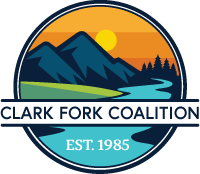Volunteer
Volunteers improve and safeguard the streams, creeks, and rivers that flow into the Clark Fork—the watershed that sustains the region. If you like to meet outdoors, make new friends, and make a difference, become a volunteer today.
What it means to be a volunteer
Engaging volunteers in directly protecting and restoring the basin builds a culture of care for the river in our community that lasts for generations. Volunteers do good work and connect with other people who care for the watershed.

Volunteer Events
Volunteer Newsletter
Our volunteer newsletter keeps you up to date on ways to connect and be an advocate for the river. We’ll also periodically share data from community science days, highlight extraordinary volunteers, and share relevant partner resources.
Interested in Becoming a Volunteer?
Contact us for more information about volunteering! We host many events and opportunities throughout the year that need capable volunteers to help with our cleanup and conservation efforts.
Volunteer FAQs
What types of work do volunteers do?
Volunteers plant in restored areas, water young transplants, collect scientific data, remove trash from riverbanks, pull invasive weeds, take photos of habitat and wildlife, assist with public outreach and education, and more.
What is community science?
Our community science programs focus on monitoring fish habitat, riparian vegetation, and invasive weeds on tributaries in the Clark Fork basin. Project managers are able to share the significance of their work, while passionate volunteers contribute their valuable time. This collaboration expands our capacity for data-driven restoration and engages people in river stewardship.
What are the requirements to be a volunteer?
Most of our volunteer opportunities do not require any special skills or knowledge. We provide any necessary training and support and welcome all abilities. We can often accommodate varying needs, although some volunteer events require physical labor and movement.
What if I signed up to volunteer but can’t make it?
We count on volunteers to complete projects, and we plan volunteer events based on registration numbers. If you can’t attend an event that you registered for, please contact the volunteer coordinator as soon as possible.
Do you only have volunteer events in the summer?
Volunteers work on a variety of projects year-round. Spring and fall are busiest with community science data collection and planting. Summer often includes watering and weeding vulnerable new riparian areas after restoration.
What is the time commitment for volunteering?
It depends on the event! Some last an hour while others are half days or multiple days.
